Debuged v1.1
JF-14A
This is a fiction
China's aviation industry experienced significant growth in the 1970s following the application of systematic aeronautical manufacturing experience gained through cooperation with the Boeing company on the Y-10 program. The industry continued to expand during Beijing's Sixth, Seventh and Eighth Five-Year Plans, released in 1981, 1986 and 1991 respectively, resulting in the production of thousands of J-7 and J-8II series aircraft. Although these second-generation fighters are impressive and can compete with international counterparts with new avionics and softwares, they may not provide a long-term solution. It is clear that China will require a state-of-the-art third-generation fighter in the future.
The Chengdu Aircraft Industry Group began designing a new canard single-engine fighter in 1981 based on the J-9 programme proposed but later scrapped in the 1960s. In late 1980s, the aircraft successfully completed its maiden flight, and its basic variant using FWP15 engine and N010 Zhuk-10 radar entered service with the PLA Air Force in 1990 as the J-10I. The J-10 series formed a high/low mix with the J-11 series which Shenyang AIG had meticulously copied and improved from the Soviet-made Su-27 Flanker for more than twenty years. They did not only held up defending the skies of the motherland, but also successfully sold to various allied countries in Asia.
As China's allies in East Asia and Africa grow in number, Beijing seeks to export advanced military equipment to the international market, which naturally includes fighter jets. While successful models such as the JF-8, JF-10, and JF-17 have been developed, they are still unable to compete with heavyweight jets like the F-15 in terms of payload and range, meanwhile China's own heavyweight J-11 series cannot be exported due to restrictions imposed by the Sino-Soviet trade agreements, as they are imitations and improvements of the Soviet-made aircrafts.
Therefore, Chengdu Aircraft Industry Group started to develop a twin-engine heavy fighter based on the successful J-10 series. Development of the new aircraft, known as the J-14 program, began in 1997. Its first prototype rolled off the production line in mid-2008 and appeared in public eye a few months later. Then two more prototypes (1404 and 1405) were delivered to the PLA Air Force's 39th Fighter Aviation Division (in fact a combined unit of both aggressor and RND roles established in 2001) in 2009 for further test flights and development. Development phase of the single-seater was completed in 2011, while low-speed production of both single and double seater variants which features additional limited multi-role combat abilities began in 2012.
The aircraft was officially revealed to the public at the 9th China International Aviation & Aerospace Exhibition in Zhuhai in 2012.
The first users included China, DPRK and Indonesia and has since been introduced to several other countries including Vietnam, Pakistan, Iran, Angola, Tanzania and Myanmar.
Screenshots
Honorable mention to:
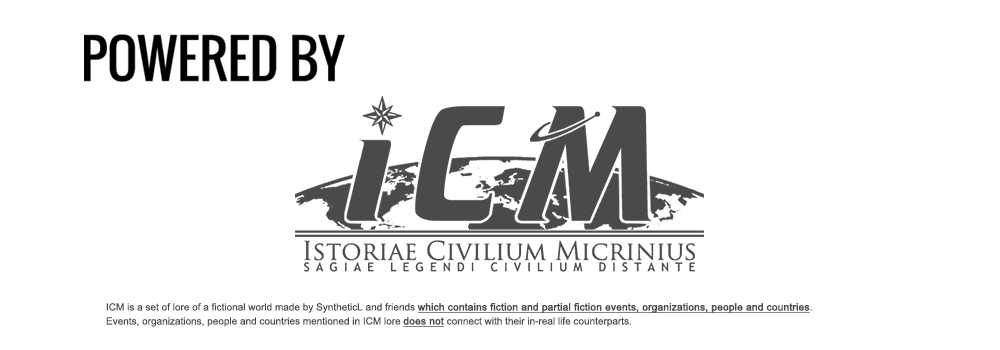
Specifications
Spotlights
- Mal0ne 10 months ago
- AWESOMENESS360 10 months ago
- RicardoACE 10 months ago
- ReignSUPREME 10 months ago
- Ian_Yashima 10 months ago
- Noname918181818181818181 10 months ago
- Inuyasha8215 10 months ago
- ZeroWithSlashedO 10 months ago
- MrCOPTY 10 months ago
- LunarEclipseSP 10 months ago
General Characteristics
- Predecessor Chengdu-JF-14S-
- Created On Android
- Wingspan 45.7ft (13.9m)
- Length 62.7ft (19.1m)
- Height 21.8ft (6.7m)
- Empty Weight 23,203lbs (10,524kg)
- Loaded Weight 36,497lbs (16,554kg)
Performance
- Power/Weight Ratio 7.85
- Wing Loading 70.7lbs/ft2 (345.0kg/m2)
- Wing Area 516.5ft2 (48.0m2)
- Drag Points 4447
Parts
- Number of Parts 2213
- Control Surfaces 5
- Performance Cost 7,708

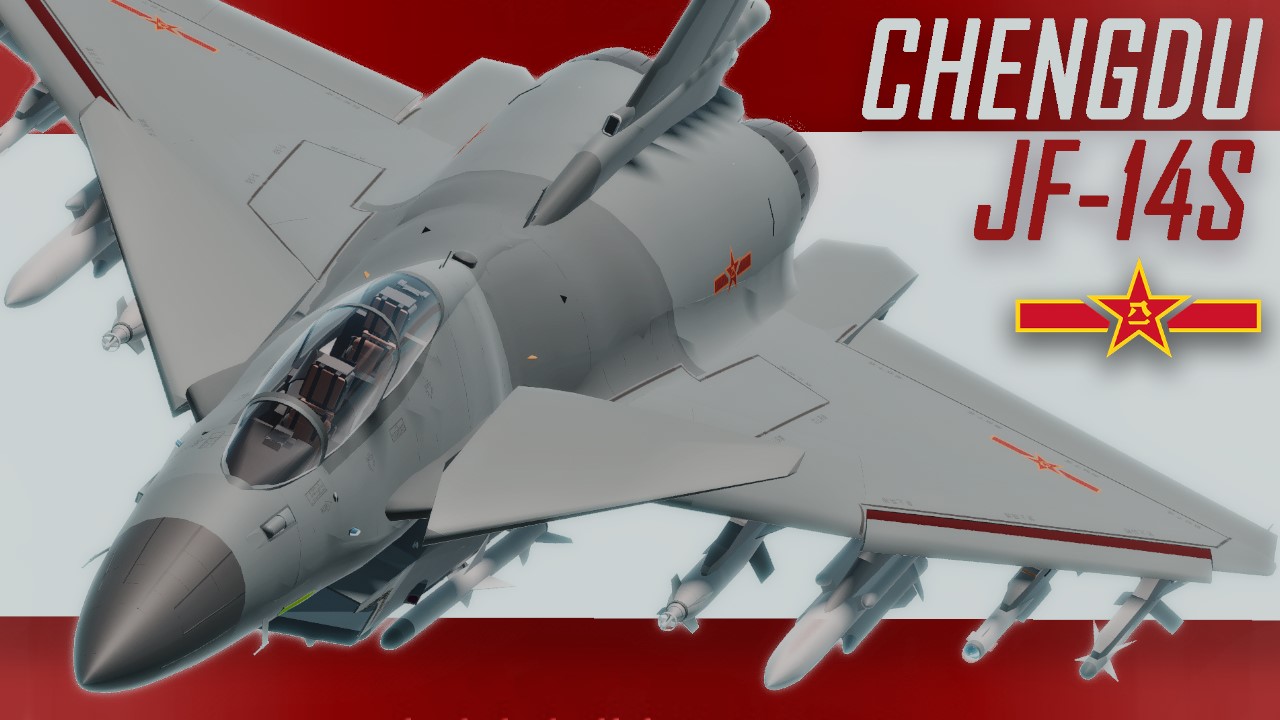
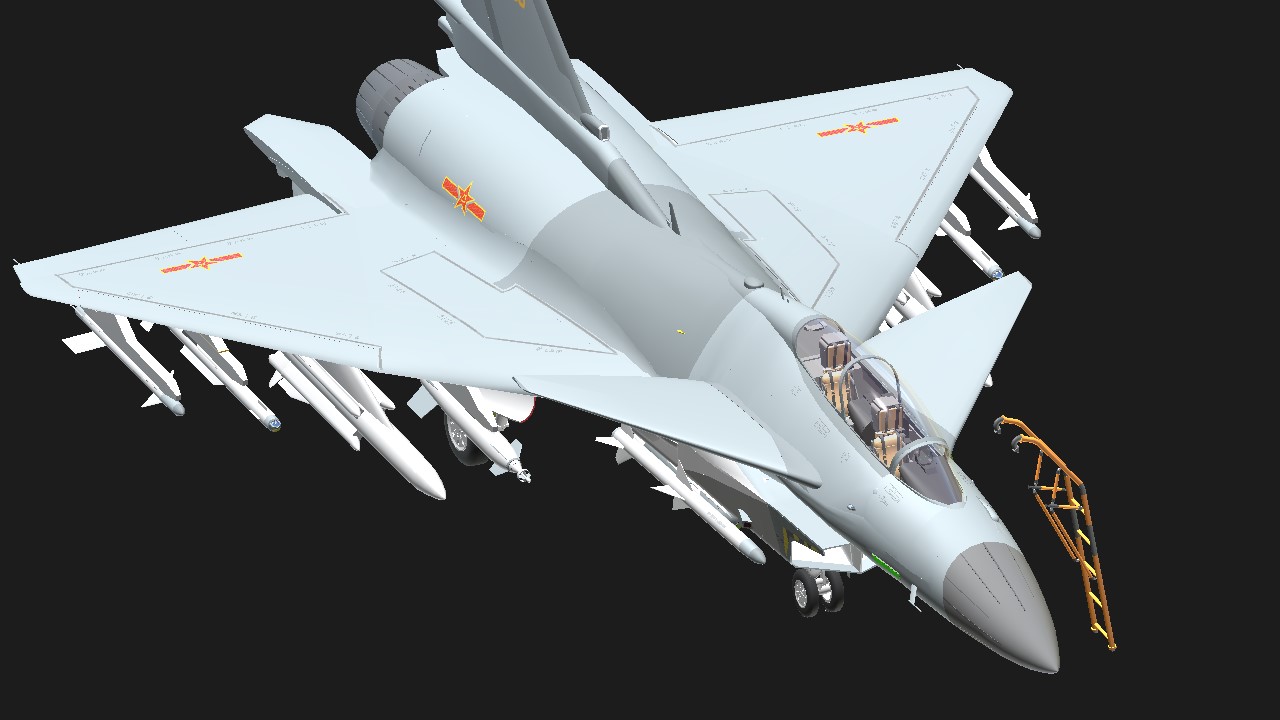
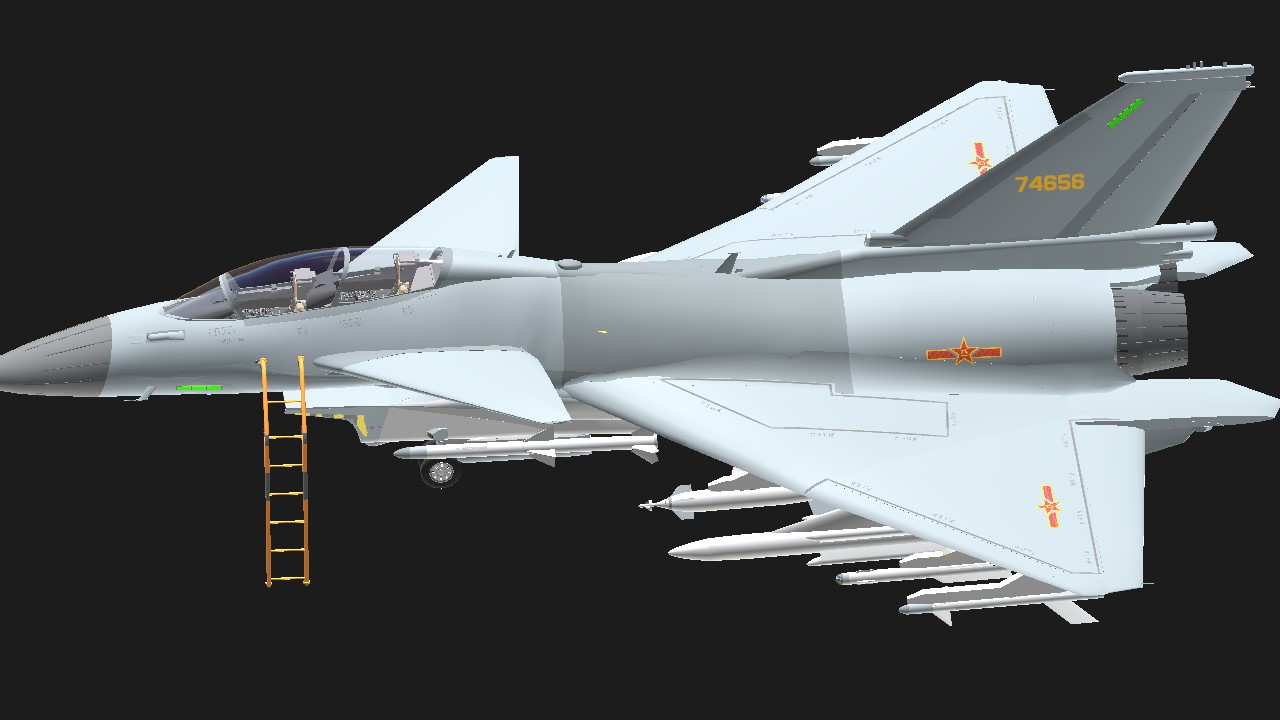











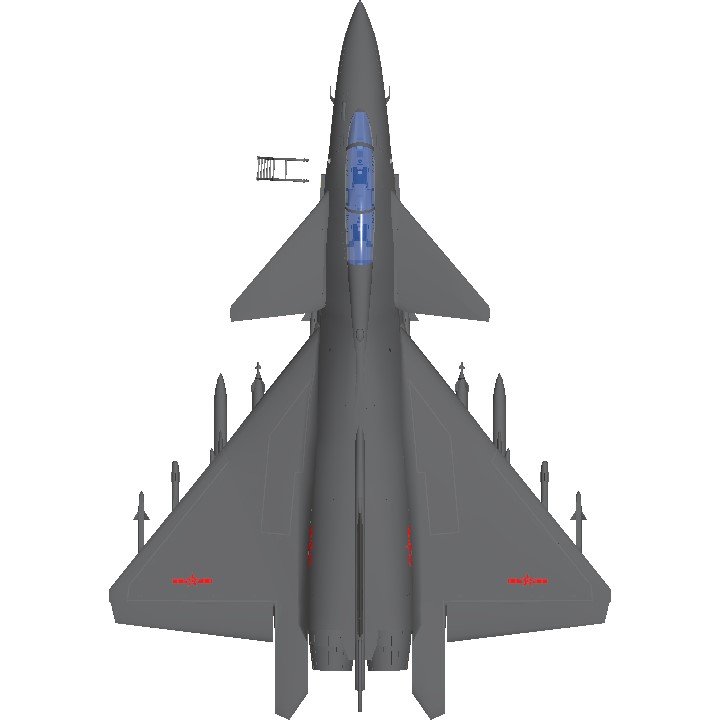
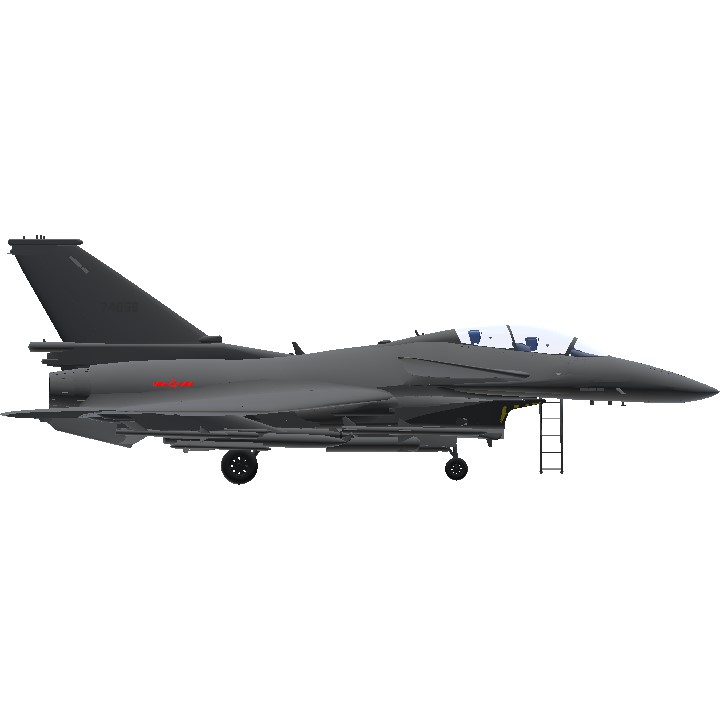
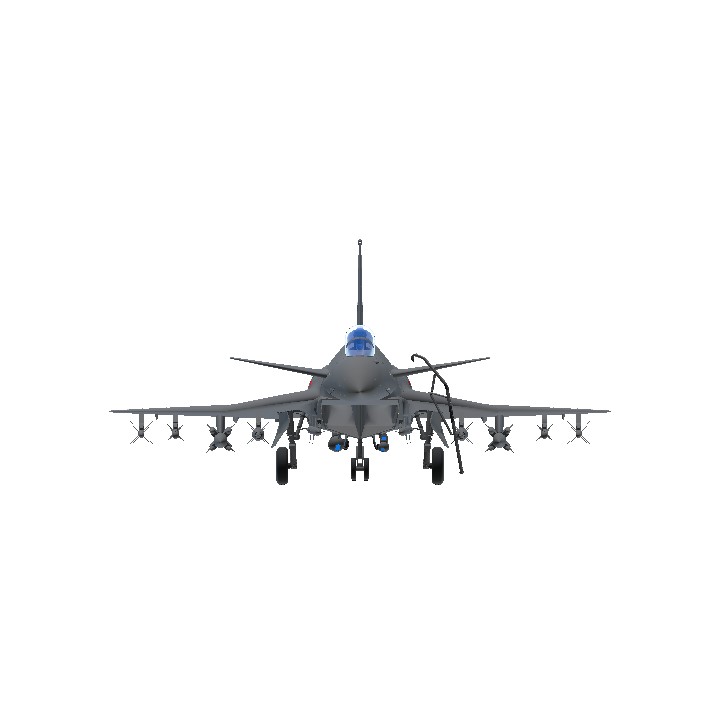
----11/vi 2024----
此为本人设定中的故事线,如有雷同纯属巧合
在1970年代获得到大量来自波音公司的系统性航空制造经验并得以运用后,中国的航空工业发展呈现出爆炸性增长态势。作为北京于1981, 1986和1991年分别发布的其第六、第七和第八个五年计划的一部分,中国制造了数以千计的歼击七型和八型飞机。这两型飞机属二代歼击机,虽然可在新型航电设备加持下与各国同时期产品进行一定程度的竞争,但也并不是长久之计。中国终究需要第一流的三代战斗机。 成都飞机工业集团于1981年开始在1960年代提出但后来废止的歼击九型计划基础上设计一型新锐的鸭翼单发歼击机,最终搭载涡喷-15型发动机和N010甲虫-10雷达的基本型于1990年开始进入人民解放军空军服役,即为歼击十型。 这一型歼击机在二十年间与沈阳飞机工业集团在苏-27飞机基础上仿制、改进制造的歼击十一型飞机形成高低搭配,不但撑起了祖国的天空,还成功销往亚洲各个盟国。
随着中国在东亚和非洲的盟友国家数量增多,北京寻求向国际市场出口更新型的军事装备,其中自然包括先进歼击机。虽然已有成功的JF-8II、JF-10和JF-17(歼击八型丁、歼击十型的出口型和枭龙),但它们在载弹量和航程等诸多方面仍然无法与F-15等重型歼击机相抗衡。与此同时,中国自用的重型歼击十一型系列飞机由于是苏制飞机的仿制、改进型,受中苏协议的限制无法进行出口。因此,成都飞机工业集团开始在歼击十型系列的成功基础上研制一型双发重型歼击机。新型飞机于1997年开始研制,称为歼击十四型。其首架原型机于2008年中下线,并在几个月后出现在公众视野中。随后两架原型机(1404和1405)在2009年被交付给解放军空军歼击航空兵第三十九师(实为于2001年成立的兼具假想敌和科研性质的混成单位)进行进一步试飞和研发。研制工作于2011年初结束并开始低速生产,具有有限多功能作战能力的双座机于2012年中开始生产第一批次。本机型于2012年第9次珠海航展正式对外公开。
第一批用户包括中国、朝鲜和印度尼西亚;其后越南、巴基斯坦、伊朗、安哥拉、坦桑尼亚、缅甸在内的多国也引进了该机。
本作为歼击十四型甲系列双座型。
China number one!
Dude, is this even simpleplanes? Its awesome!
Sinofighter Typhoon lol
"created on android"
bro, what kind of phone did you have 😭
Not mobile
最帅的一架
你们又泄露国家机密!战忽局的同志们又骂娘了
If my iPad processor could talk, it would be screaming in pain
此四代机非彼四代机,我们搞的不是美国意义上的第四代战斗机,也不是俄罗斯意义上的第五代战斗机,我们是在歼-10基础上的改进。如果说歼-10是我理解是如果是三点五的话,它叫三代半,如果歼-10是三点五的话,那有可能是三点八、三点七,类似于这样的,是一个改进版,但是网上传了半天,其实我们的心思就是说是歼-10改,结果炒来炒去,炒成中国的四代机,哪那么容易就搞出来啊,美国F-22搞了二十多年,那中国四代机这还没打算搞呢,这就吹气就成了,这不可能的事情。😋😋
Great
且看乘空行万里!
I like this.
sheesh
i was just looking this stuff up
very sad to say, its very difficult to control
This plane looks absolutely incredible, amazing work man. That main picture is one of the coolest and most well-portrayed ones that I have seen in a while.
@LunarEclipseSP EXCUSE ME?! CHINA, PLS HIRE @LunarEclipseSP! And @Rafalemmm.
@Rafalemmm yeah, J-10 Vigorous Dragon is looks like a fusion between the Typhoon and F-16
@Alternation sus
love this so nuch because of the MiG-1.44 vibes
MIG 1.44 noises
@LunarEclipseSP I see , and honestly, during the construction process, I did indeed experience the evolution of this aircraft's design, shifting from resembling the J-10 to adopting features of the EF2000, and finally transforming into something akin to the Mikoyan MFI.
@Rafalemmm that's an interesting explanation you got there ( •. •)
@LunarEclipseSP
That could be true, In the practical construction and during discussions with the SyntheticL, I actually referenced a model of Chengdu's proposed twin-engined stealth development of the J-10 . As for the shape of the Inlet, I drew inspiration from the Mig-1.42 Mikoyan MFI.
By comparing, you can see that both have their Inlets twisted at a certain angle relative to the fuselage. I referenced this design with the intention of maintaining sufficient airflow during supersonic flight.
Incidentally, considering the positioning perspective, this tactical aircraft of an later generation exported to third-world countries to maintain regional balance might be difficult to directly compare with the Mig 1.44, given their distinct eras and intended roles.